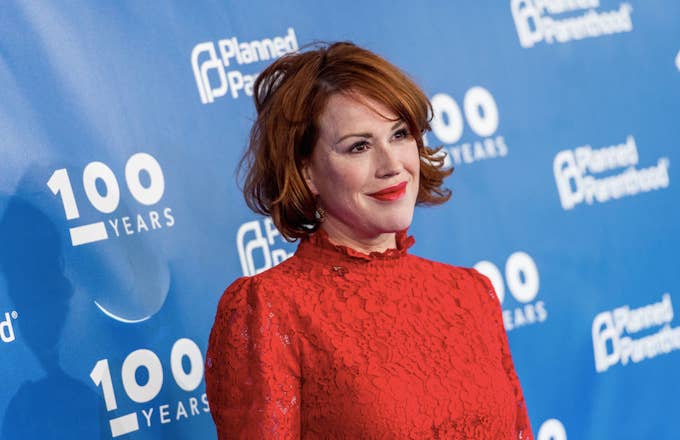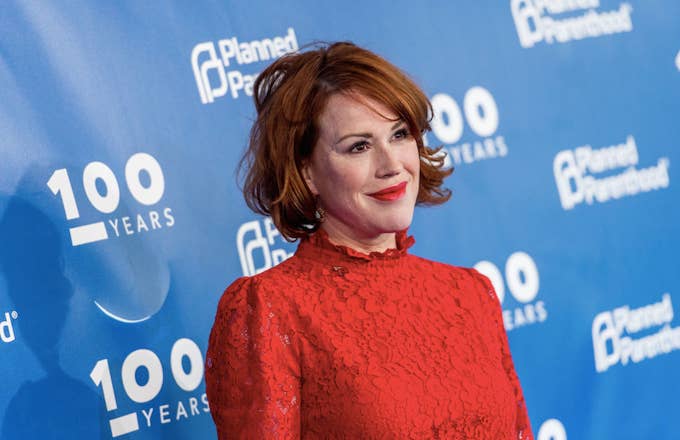
Molly Ringwald reached icon status in the 1980s, thanks in large part to her roles in Sixteen Candles, The Breakfast Club, and Pretty in Pink. Like many of us, the 50-year-old actress says she recognizes the significance and cultural impact of these John Hughes classics; however, in light of the widespread #MeToo movement, she has become troubled by the film’s sexist undertones.
“Hughes’s films play constantly on television and are even taught in schools. There is still so much that I love in them, but lately I have felt the need to examine the role that these movies have played in our cultural life: where they came from, and what they might mean now,” she wrote in a recent essay for the New Yorker. “When my daughter proposed watching The Breakfast Club together, I had hesitated, not knowing how she would react […] I worried that she would find aspects of it troubling, but I hadn’t anticipated that it would ultimately be most troubling to me.”
Ringwald, who previously penned an essay about “all the other Harvey Weinsteins” she’s encountered, went on to address the misogyny she witnessed while working with Hughes in her early career. She detailed certain scenes and plot points that she claims made her uncomfortable, while also acknowledging the “symbiotic relationship” she had with the famed writer/director.
“It’s hard for me to understand how John was able to write with so much sensitivity, and also have such a glaring blind spot,” she wrote.
Ringwald called attention to one famous scene in The Breakfast Club in which her character, Claire, is presumably sexually assaulted by Judd Nelson as John Bender.
“At one point in the film, the bad-boy character, John Bender, ducks under the table where my character, Claire, is sitting, to hide from a teacher. While there, he takes the opportunity to peek under Claire’s skirt and, though the audience doesn’t see, it is implied that he touches her inappropriately,” Ringwald wrote. “[…] I kept thinking about that scene. I thought about it again this past fall, after a number of women came forward with sexual-assault accusations against the producer Harvey Weinstein, and the #MeToo movement gathered steam. If attitudes toward female subjugation are systemic, and I believe that they are, it stands to reason that the art we consume and sanction plays some part in reinforcing those same attitudes.”
Ringwald also pointed to the Sixteen Candles character Caroline (Haviland Morris), who—after a long night of drinking—is traded for a pair of underwear. The film implies Caroline had some sort of sexual encounter with the character named “The Geek”; however, because she was unconscious during the encounter, she can’t remember the details of the night.
[W]hen she wakes up in the morning with someone she doesn’t know, he asks her if she ‘enjoyed it.” (Neither of them seems to remember much.) Caroline shakes her head in wonderment and says, ‘You know, I have this weird feeling I did.’ She had to have a feeling about it, rather than a thought, because thoughts are things we have when we are conscious, and she wasn’t.
But sexism wasn't the only issue within Hughes' work. Ringwald also addresses instances of racism—such as the wildly offensive character of Long Duk Dong (Gedde Watanabe), in Sixteen Candles—as well as a homophobia—like the liberal use of gay slurs within in dialogue.
“How are we meant to feel about art that we both love and oppose? What if we are in the unusual position of having helped create it?” she wrote. “Erasing history is a dangerous road when it comes to art—change is essential, but so, too, is remembering the past, in all of its transgression and barbarism, so that we may properly gauge how far we have come, and also how far we still need to go.”
You can read Ringwald’s full piece here.

